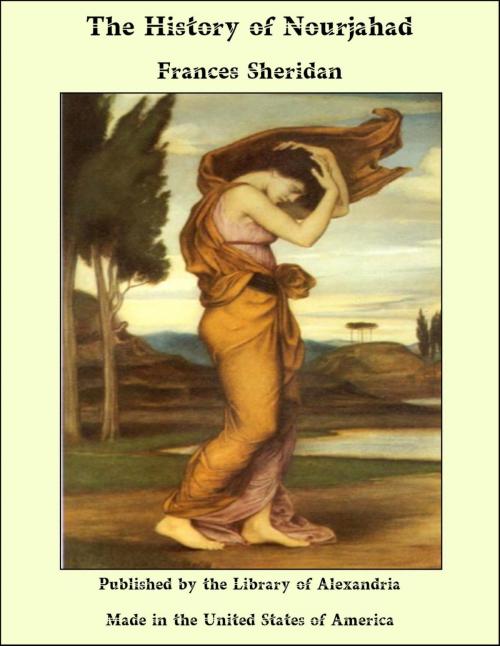The History of Nourjahad
Nonfiction, Religion & Spirituality, New Age, History, Fiction & Literature| Author: | Frances Sheridan | ISBN: | 9781465581549 |
| Publisher: | Library of Alexandria | Publication: | March 8, 2015 |
| Imprint: | Language: | English |
| Author: | Frances Sheridan |
| ISBN: | 9781465581549 |
| Publisher: | Library of Alexandria |
| Publication: | March 8, 2015 |
| Imprint: | |
| Language: | English |
Schemzeddin was in his two and twentieth year when he mounted the throne of Persia. His great wisdom and extraordinary endowments rendered him the delight of his people, and filled them with expectations of a glorious and happy reign. Amongst the number of persons who stood candidates for the young sultan’s favour, in the new administration, which was now going to take place, none seemed so likely to succeed, as Nourjahad the son of Namarand. This young man was about the age of Schemzeddin, and had been bred up with him from his infancy. To a very engaging person was added a sweetness of temper, a liveliness of fancy, and a certain agreeable manner of address, that engaged every one’s affections who approached him. The sultan loved him, and every one looked on Nourjahad as the rising star of the Persian court, whom his master’s partial fondness would elevate to the highest pinnacle of honour. Schemzeddin indeed was desirous of promoting his favourite, yet notwithstanding his attachment to him, he was not blind to his faults; but they appeared to him only such as are almost inseparable from youth and inexperience; and he made no doubt but that Nourjahad, when time had a little more subdued his youthful passions, and matured his judgment, would be able to fill the place of his first minister, with abilities equal to any of his predecessors. He would not, however, even in his own private thoughts, resolve on so important a step, without first consulting with some old lords of his court, who had been the constant friends and counsellors of the late sultan his father. Accordingly having called them into his closet one day, he proposed the matter to them, and desired their opinion. But before they delivered it, he could easily discover by the countenances of these grave and prudent men, that they disapproved his choice. What have you to object to Nourjahad, said the sultan, finding that they all continued silent, looking at each other? His youth, replied the eldest of the counsellors. That objection, answered Schemzeddin, will grow lighter every day. His avarice, cried the second. Thou art not just, said the sultan, in charging him with that; he has no support but from my bounty, nor did he ever yet take advantage of that interest which he knows he has in me, to desire an encrease of it. What I have charged him with, is in his nature notwithstanding, replied the old lord. What hast thou to urge, cried the sultan, to his third adviser? His love of pleasure, answered he. That, cried Schemzeddin, is as groundless an accusation as the other; I have known him from his childhood, and think few men of his years are so temperate. Yet would he indulge to excess, if it were in his power, replied the old man. The sultan now addressed the fourth: What fault hast thou to object to him, cried he? His irreligion, answered the sage. Thou art even more severe, replied the sultan, than the rest of thy brethren, and I believe Nourjahad as good a Mussulman as thyself. He dismissed them coldly from his closet; and the four counsellors saw how impolitic a thing it was to oppose the will of their sovereign.
Schemzeddin was in his two and twentieth year when he mounted the throne of Persia. His great wisdom and extraordinary endowments rendered him the delight of his people, and filled them with expectations of a glorious and happy reign. Amongst the number of persons who stood candidates for the young sultan’s favour, in the new administration, which was now going to take place, none seemed so likely to succeed, as Nourjahad the son of Namarand. This young man was about the age of Schemzeddin, and had been bred up with him from his infancy. To a very engaging person was added a sweetness of temper, a liveliness of fancy, and a certain agreeable manner of address, that engaged every one’s affections who approached him. The sultan loved him, and every one looked on Nourjahad as the rising star of the Persian court, whom his master’s partial fondness would elevate to the highest pinnacle of honour. Schemzeddin indeed was desirous of promoting his favourite, yet notwithstanding his attachment to him, he was not blind to his faults; but they appeared to him only such as are almost inseparable from youth and inexperience; and he made no doubt but that Nourjahad, when time had a little more subdued his youthful passions, and matured his judgment, would be able to fill the place of his first minister, with abilities equal to any of his predecessors. He would not, however, even in his own private thoughts, resolve on so important a step, without first consulting with some old lords of his court, who had been the constant friends and counsellors of the late sultan his father. Accordingly having called them into his closet one day, he proposed the matter to them, and desired their opinion. But before they delivered it, he could easily discover by the countenances of these grave and prudent men, that they disapproved his choice. What have you to object to Nourjahad, said the sultan, finding that they all continued silent, looking at each other? His youth, replied the eldest of the counsellors. That objection, answered Schemzeddin, will grow lighter every day. His avarice, cried the second. Thou art not just, said the sultan, in charging him with that; he has no support but from my bounty, nor did he ever yet take advantage of that interest which he knows he has in me, to desire an encrease of it. What I have charged him with, is in his nature notwithstanding, replied the old lord. What hast thou to urge, cried the sultan, to his third adviser? His love of pleasure, answered he. That, cried Schemzeddin, is as groundless an accusation as the other; I have known him from his childhood, and think few men of his years are so temperate. Yet would he indulge to excess, if it were in his power, replied the old man. The sultan now addressed the fourth: What fault hast thou to object to him, cried he? His irreligion, answered the sage. Thou art even more severe, replied the sultan, than the rest of thy brethren, and I believe Nourjahad as good a Mussulman as thyself. He dismissed them coldly from his closet; and the four counsellors saw how impolitic a thing it was to oppose the will of their sovereign.















